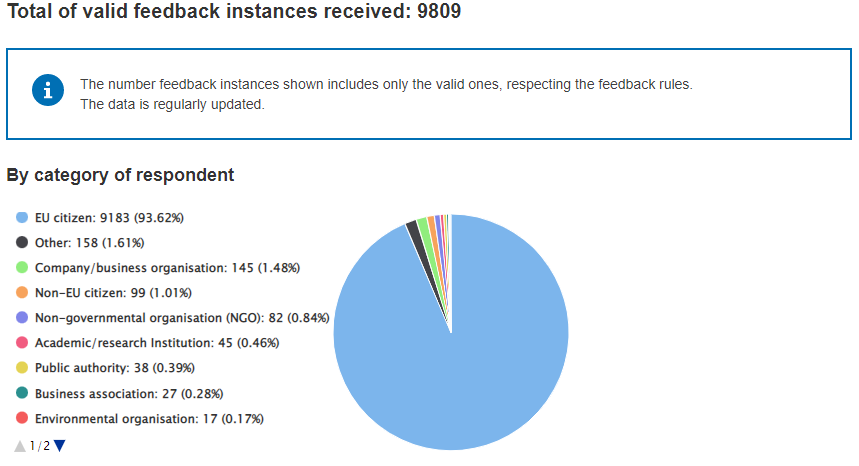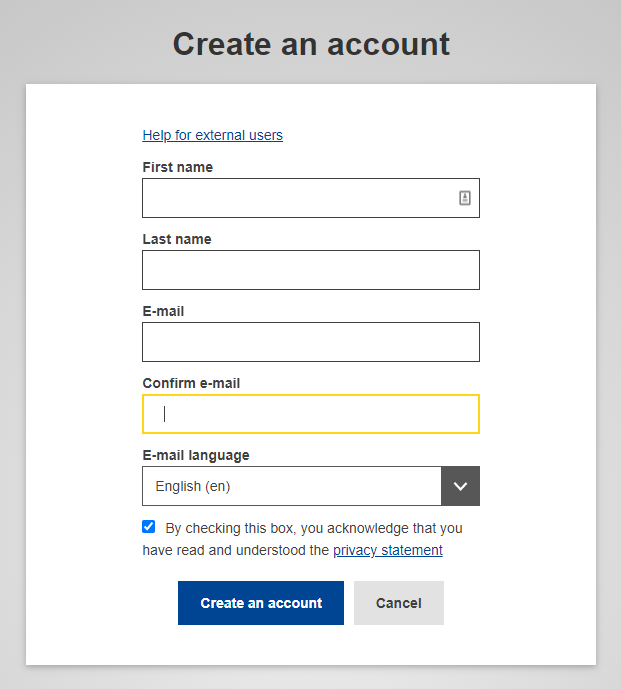Sharing this here quickly, as I have been made aware of it, and it seems very important to publicise. Please complete/share it where relevant.
The EU is currently in the process of revising its animal protection policies and using a survey to collect input between 15 October 2021 and 21 January 2022.
I have been told that it is one of the most significant opportunities for animal welfare progress on a legislative level ever seen in the EU.
Anyone can participate, including research institutions.

In many countries, there have been relatively few responses. Only 21 people in Ireland have responded to the survey, for instance. People from these countries can potentially have a more outsized response on their representatives or local policy. [Not sure how it works, but I imagine EU representatives will be particularly sensitive to responses from their citizens.]
To participate, you need to sign up for an account by email. It took about five minutes from asking to create an account, to being sent the sign-up email and arriving at the survey page.

How should I fill out the survey?
Conor Spence has written a Google doc guide showing how to fill in the survey with screenshots. This is based on the content below.
Alternatively, please see this guide from Anima International, or contact animal advocacy organisations in the Open Wing Alliance (OWA) and Eurogroup for Animals (EfA) networks (the links show who the member organisations in your country are). [Thanks to Neil Dullaghan for making me aware of the organisations and initiatives].
Neil also suggests: In the last section "14. Is there any other comment you would like to add?", which the video doesn't cover, one may want to use that space to address other issues such as requesting bans on octopus farming and fur farming (though I personally am a little sceptical the EU can/will outright ban an entire sector).
Acknowledgements
I'd like to thank Cian Mullarkey from EA Ireland for making me aware of this opportunity.

I've written a Google doc guide showing how to fill-in the survey with screenshots (example below) so people can complete the survey quickly and conveniently.
I used the suggestions from the Anima International video on YouTube and their website that you mentioned. Thanks for creating this post!
https://docs.google.com/document/d/13q0Oya3CpuBuzF2zuBsFf6vmjdrYaJeLeiAB1nrrOks/edit?usp=sharing
Thanks for making this doc Conor! I don’t have many Twitter followers, but I tweeted your guide along with the Anima International video. 😄
Thanks, Conor, I have added the updated information to the post and will add it to my social media posts in my next wave of promotion.
Thanks, Peter, glad this text guide is useful! For some reason the images in the google doc guide don't display very well on my phone. I'm not sure if others will have this issue. It displays clearly on the computer though. I guess most people will complete the EU survey at a computer alongside the guide, so it may not be an issue.
Great. Thanks Nathan! :D
More than 10,000 EU citizens have completed the EU animal welfare survey in the last week alone. Good work!
H/T Jan Sorgenfrei for informing me about the response number update.
Commissioner for Health and Food Safety, Stella Kyriakides said "this has reached today a record of over 40,000 contributions. I think you will all agree with me, dear members, that this clearly shows how much animal welfare matters to our citizens."
H/T Jan Sorgenfrei again
I created a short blurb for use on social media posts. Feel free to use it:
---
This is probably the most impactful action you can take for animals this year!
The European Union (EU) is currently conducting what may be the most important survey ever created for animals.
The EU is revising its animal welfare laws and is using this survey to collect input. Some countries have very few responses so far, and so this seems a particularly low effort way to influence major policy decisions at the EU level. It doesn’t take long to complete and is worth doing even if you are not an EU citizen.
EU Survey:
https://ec.europa.eu/info/law/better-regulation/have-your-say/initiatives/12950-Animal-welfare-revision-of-EU-legislation/public-consultation_en
Here’s a text guide with suggested responses for the survey.
https://docs.google.com/document/d/13q0Oya3CpuBuzF2zuBsFf6vmjdrYaJeLeiAB1nrrOks/edit?usp=sharing
These suggestions are taken from the Anima International video guide https://www.youtube.com/watch?v=S9rpDREdp10 which are based on advice from EU animal advocacy experts.
Photo by Sam Carter (Unsplash)
More details you can add (if needed):
-----------
Most of the questions are simple ‘clickable’ answer choices, but the final question gives you an opportunity to write further comments / make requests if you like. For example, you could ask for:
It’s best if you write these comments IN YOUR OWN WORDS so not everyone writes exactly the same words!
---------
Or please see suggestions given above by Neil and Jan! Thanks!
Just want to flag that animal advocacy organizations in the Open Wing Alliance (OWA) and Eurogroup for Animals (EfA) networks have been trying to coordinate the responses to this survey to ensure a consistent ask is made.
I'd encourage anyone interested in filling out this survey to make contact with the OWA or EfA groups (or other effective animal advocacy organizations not in these associations) in your country for advice (the links above show who the member organizations in your country are).
Thanks Neil, that's very helpful. I didn't know about those initiatives. I have since looked for more information about the best way to complete the survey. Someone shared this post from Anima International with me and it seems to be the best guide available. Please let me know if you don't think that it is a good source.
For now, I will add that link and your recommendations for other orgs to contact to the post.
Please let me know if you have any links from those organisations you mention that is immediately usable (e.g., a blog post or video).
Thanks for adding that Anima link Peter. Following the video guide on that page is what I would suggest anyone filling in this survey do for the most impact, unless they have strong reasons to answer the questions differently.
I'd also add that in the last section "14. Is there any other comment you would like to add?", which the video doesn't cover, one may want to use that space to address other issues such as requesting bans on octopus farming and fur farming (though I personally am a little sceptical the EU can/will outright ban an entire sector)
Great, thanks. I have added your comment to the post.
Thank you, Peter, for updating the post with the video tutorial. It's part of a toolkit we have been promoting to animal advocacy groups through our networks in order to increase their capacity for engaging their followers.
In regard to part 14 (the open commentary) Anima International will, as Neil also suggests, use this opportunity to ask for more focus on fish and invertebrates:
"Widening the scope: It is important that species specific requirements are in place for all animals, including the groups that are currently excluded or have only minimal legal protection, such as fish and invertebrates. It is also important that these requirements incorporate up to date scientific knowledge and consider the moral attitudes of citizens."
Our full comment can be seen here for inspiration.
Excellent, thanks for your work on this Jan! I have also posted about your video in a few animal advocacy groups. Unfortunately, most of the communities that I am involved in and aware of are more focused on street and social media activism, so I haven't got as much traction as I think that the opportunity justifies. I will keep trying, though.
Thanks Jan! Just saw this after creating my social media blurb. I've added it to my other comment here.
Sorry if this is a very dumb question -- can non-EU people fill out the survey/will it make any difference if they do? For example, I see that a small number of people from the US filled out the survey. Are those just people from NGOs/consumer organizations or food business operators?
Thanks for the question! Yes, non-EU people can fill out the survey. I think that it has sufficient expected value for it to be worth doing for most EAs interested in animal welfare because participation offers a small chance of having a very big positive effect by tipping interpretations in a positive direction. This blog post provides more information, including a recommendation for specifically for Non-EU voters.
I just completed my submission. It took around five minutes using Conor's guide, which was quicker than I expected. I think you could probably do it in about 3 minutes if you were in a rush!